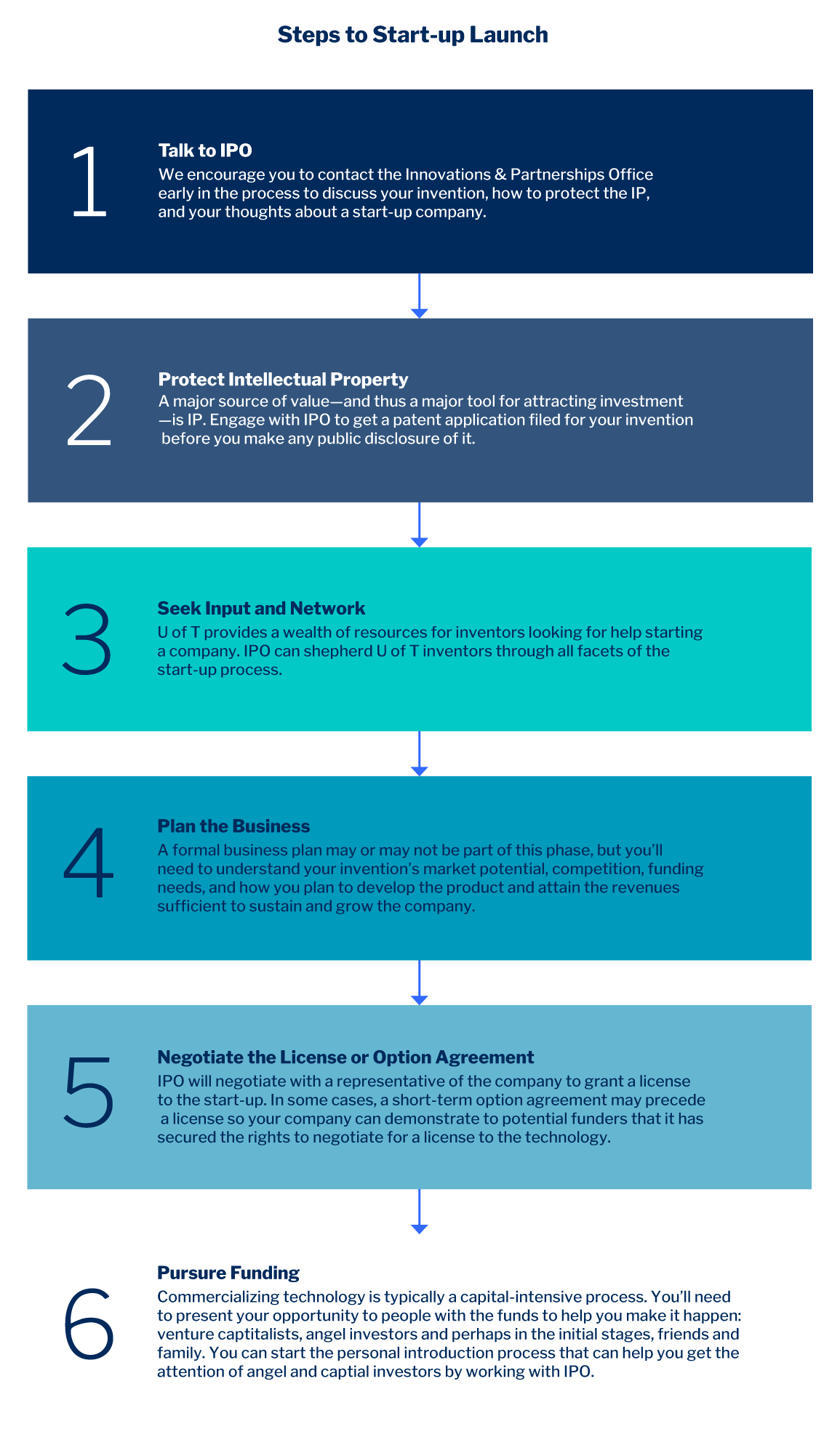The University of Toronto (U of T) has a vibrant entrepreneurial community with many initiatives and programs to help create and grow new companies. U of T is a leader in Canada and among the top five institutions in North America for creating research-based startups. The U of T entrepreneurship community has created over 500 companies in the last 10 years and secured over $1.5 billion in investment.
The Innovations & Partnerships Office (IPO) supports the creation of early stage companies based on U of T inventions by providing entrepreneurship education and mentorship, IP protection, go-to-market strategies, networking, and investor preparation.
Launch a Startup

- Talk to IPO
Starting a company based on U of T inventions, computer software, research data or research tools begins by formally disclosing any of the above to IPO by submitting a Confidential Invention Disclosure form. This form defines the invention, inventors, and funding sources used to create the U of T invention.
For more information, visit Disclose an Invention and Inventions Policy and Revenue Sharing.
- Protect IP
Once an invention is disclosed, inventors may choose to assume full ownership and responsibility for patenting and commercialization or can offer the invention to U of T. If the inventors choose to take personal ownership, the University will assign the invention to the inventors who will use their own resources to patent. If IPO accepts the invention into U of T’s portfolio, U of T will manage and pay for the patenting process.
Patent protection can be important in the process of turning ideas and innovations into new products and services. Patents are often valued by commercialization partners, entrepreneurs, and investors seeking to bring new innovations to the market.
Patent rights are affected by public disclosure (e.g. written publication or presentation) of the invention, so it is best to involve IPO early in the invention and patent assessment process.
Learn more at Protect Intellectual Property.
- Seek Input & Network
With diverse expertise across faculties, departments, campuses, U of T has many resources to build sustainable companies. Startups can take advantage of U of T’s growing ecosystem of accelerators, courses, and programming across a diverse range of sectors and company stages. Accessing U of T’s network is one way to engage advisors and investors.
Learn more about University of Toronto Entrepreneurship.
- Plan the Business
Most U of T inventions (e.g. product or service) are early-stage and require further research and development prior to starting a company. The company typically makes significant investments of time and resources to develop a business plan and commercialize the product or service. These activities may include planning for regulatory approvals, sales and marketing, hiring, training, fund raising, etc.
One of the first steps to launching a startup can be to formally incorporate and register a new corporate entity. Typically, U of T companies incorporate federally in Canada for wider rights and to avoid incorporating separately in each province. IPO uses external legal counsel to support the company creation process.
Company founders will need to create a capitalization table to define the equity distribution in the company. In most cases, the company will set aside equity to allocate to new employees as the company grows; this is commonly referred to as the employee stock option pool (ESOP). The founders and equity holders will also need to execute a shareholder agreement. This agreement defines the shareholder rights and protocols and provides protection if company founders leave or new shareholders join the company.
- Negotiate the License or IP Agreement
For inventions assigned to U of T, IPO will negotiate and execute an option, license, or assignment agreement between the University and startup. Agreements to license U of T technology into a startup have both financial and nonfinancial terms based on the technology, stage of development, field of use, and commercialization risks.
Typical terms include the following.
- Cash considerations, including annual fees, milestone payments, and/or royalties on product sales
- A minority share of equity in the company in partial lieu of cash consideration. Equity is also a way for the university to share some of the risks and rewards associated with startups
- Repayment of patent expenses incurred by the university
- Diligence terms to ensure reasonable progress in growing the company and commercializing the invention
- Pursue Funding
Technology commercialization is typically a capital-intensive process. Entrepreneurs may need to work with venture capitalists, angel investors, public programs, or even friends and family to raise the funding they need to gain customer traction.
The University of Toronto Early-Stage Technology (UTEST) program is a 12-month incubator for high-potential startups based on U of T Inventions. UTEST provides funding, workspace, mentoring and business strategy support. To learn more, visit the UTEST website.
For more information about entrepreneurship ecosystem at U of T, including accelerators, startup news, and courses and workshops, visit
- Provide entrepreneurship education and mentorship
- Develop go-to-market strategies, networking, and investor preparation
- Advise on U of T’s Inventions Policy
- Receive and evaluate Confidential Invention Disclosures
- Support the protection of U of T IP through patenting and other means
- Assist in finding partners and funding to support proof-of-concept and commercialization
Staff
Toronto Innovation Acceleration Partners >A CECR specializing in early-stage seed investing for companies and technology emerging from its 15 member institutions, of which U of T is one
CCRM >A CECR that aims to harness the power of stem cells and biomaterials to treat disease




